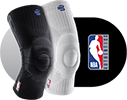While running, you want to give your best and achieve your goals. You’re always focusing on your fastest times – and this much is certain: nothing can stop you now – not even knee pain.
The Bauerfeind Sports Knee Support helps stabilize your knee joint and power your muscles. It also relieves strain on your kneecap. This means you can improve your running performance and accelerate regeneration. Leave behind knee fatigue as well as disruptive breaks from training and competitions.
CAUSES OF KNEE PAIN DURING A RUN
Knee pain while running is usually caused by a well-known problem among runners: the well-named “Runner’s Knee.” It mainly results from:
- Training too hard
- Unsuitable footwear
- Weak muscles
- Insufficient stretching
Beginners in particular increase the extent of their training too quickly. They don’t take enough time to rest, and then complain about knee pain during running because of excessive strain.
TRAINING TIPS FOR PAIN-FREE RUNS
You can prevent excessive strain by preparing your muscles, tendons, and ligaments with a training plan that is tailored to your level of fitness. Only increase the complexity of your training slowly and ensure you take appropriate breaks. For healthy athletes without problems, an increase in training of ten percent each week is the golden rule. Athletes who have existing health issues or previous injury should increase their training by about five percent each week.
Get the right footwear if you want maximum performance: If you feel pain while running, you should have your foot and leg alignment checked by a professional. One cause can be a misalignment, for example, which can be countered with foot orthoses like the Bauerfeind Sports Insoles – Run & Walk. Your running shoes must provide perfect support for your feet and cushion impact.
Find the best trails for your runs: Hilly trails put significantly more strain on your knees. When you’re jogging downhill, the load is much higher than on a level surface. If you’re getting back into running, or you’re particularly prone to knee pain, you should avoid trails with changing height profiles. If part of your route does go downhill, you can reduce the impact on your knees by taking many small steps.

JUST CHILLING – HOW TO FIGHT ACUTE KNEE PAIN
If you get knee pain, it’s time to take a break from being active. Locate the pain and cool the surrounding tissue with ice several times per day. To make sure the tissue isn’t damaged by the cold, wrap a towel around the ice. If possible, elevate your knee and reduce strain as much as you can. If the pain does not subside, go see a physician.
Exercises – stretching and strength training: During a run, all the leg muscles up to your buttocks are active. For improved performance and better protection against injuries, the muscles at the front and back of the thighs also need to be trained. One leg is usually stronger than the other. You should therefore do strengthening exercises, such as squats, on one leg and change sides. Otherwise, the stronger leg will work harder and the muscular imbalance will remain.
To prevent injuries, stretching is just as important because stiff calf and thigh muscles apply pressure to the knee and can cause pain.
- Stretching the thigh muscles: Stand in front of a chair and place your heel on it with your leg straight. Keep your back straight and slowly lean forward with your upper body by bending the hips. Lean forward until you feel a stretching sensation at the back of your leg. Remain in this position for 30 seconds, then change sides.
- Strengthening your leg muscles: Lie on your back, bend your left knee with your left foot remaining on the floor. Now lift your right leg at an angle of 30 to 60 degrees. Your knee should be almost completely straight during this exercise. Repeat the up and down movement ten times, then do the exercise with the other leg. Stabilization training on one leg on a wobbly surface and general strengthening of the hips and legs are also very useful.
RUNNING AFTER MENISCUS SURGERY – IS THAT EVEN POSSIBLE?
In the knee joint, the medial and lateral meniscus cushion impact. They guide the movements of the knee joint and stabilize the ligament structures. After meniscus surgery, you can put a load on your knee joint straight away – of course, only as far as the pain will allow. Crutches are generally only used for a few days. Running is usually allowed after four weeks. Just to make sure though, speak to the orthopedic specialist who is treating you.
COMFORT AND STABILITY WITH THE BAUERFEIND SPORTS KNEE SUPPORT
The breathable Bauerfeind Sports Knee Support, with anatomical fit and regulated compression, offers protection against excessive strain, improves movement control during running, and gently massages your ligaments, tendons and muscles with every movement. The combined compression and massage improve sensorimotor function. Reduce your risk of pain and injury with the Bauerfeind Sports Knee Support
Designed for improved performance & better protection: Bauerfeind’s 3D AirKnit® is a highly-elastic knitted fabric providing medical-grade compression in a comfortable, durable knee brace. This compression supplies the knee joint with more oxygen to improve the body’s natural healing and regeneration for less pain and faster recovery times.
The 3D anatomical design ensures a perfect fit for the ultimate support. Air ventilation zones wick moisture from sweat to keep your skin comfortably cool, and the knit provides support without limiting your freedom of movement while running.
The Sports Knee Support’s innovative patella pad absorbs pressure peaks provide you with positive sensorimotor feedback.
Bauerfeind Sports products - “Made in Germany”: Bauerfeind has been developing highly effective medical aids and supporting top athletes for decades. Our Bauerfeind Sports product line is based on the know-how gathered from these areas and from the athletes’ experiences. We constantly improve our products in the Bauerfeind Innovation Center. That is why you can be sure that your Bauerfeind Sports Knee Support is at the cutting edge of sports science.




